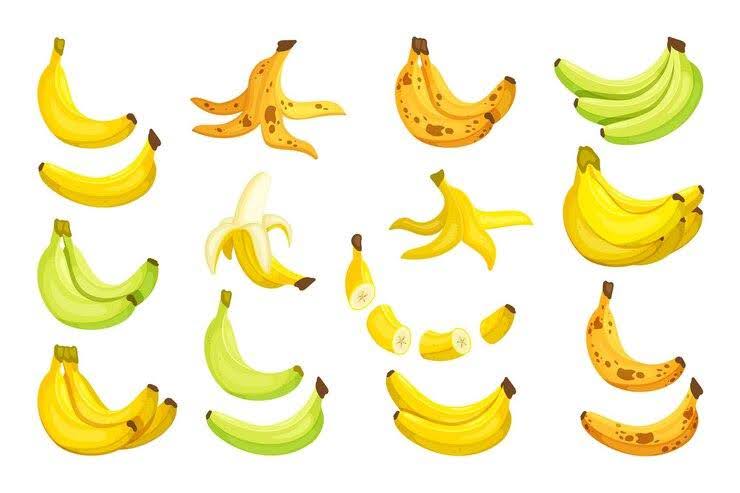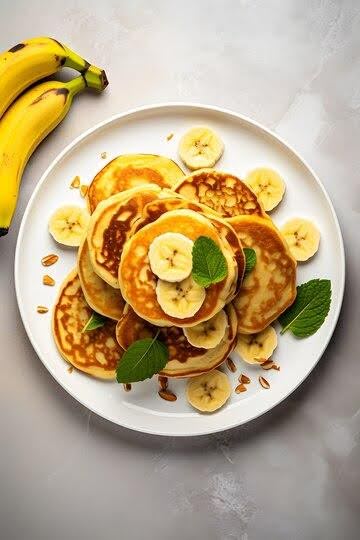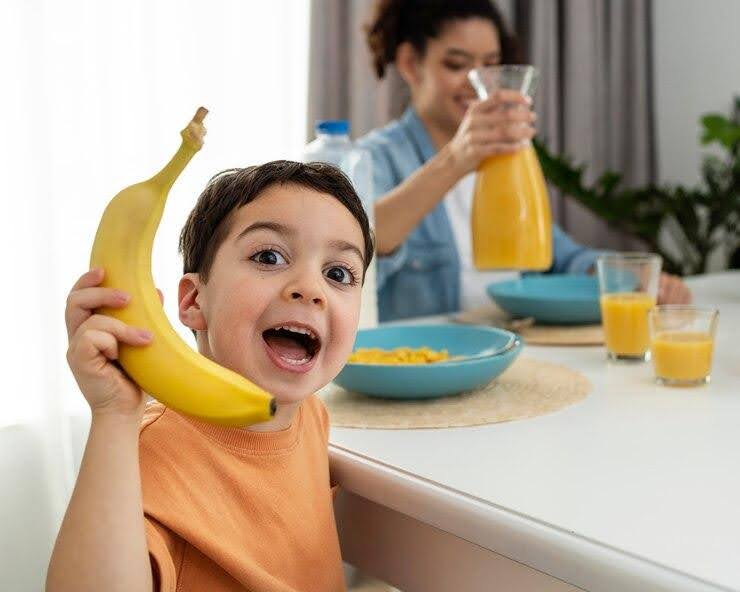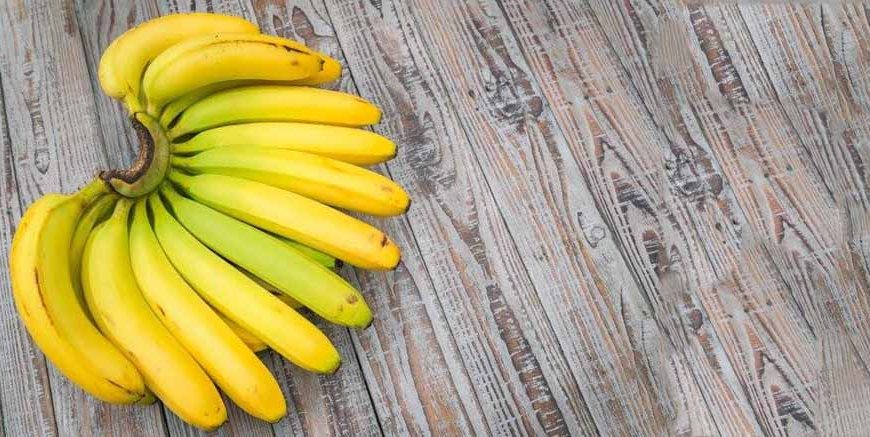When your child is growing up, advancing from taking only milk and other liquids to a world of exquisite foods, bananas are usually among the favorites as they incorporate it into the baby’s diet. This tender, sweet fruit is actually highly favored by babies although it has a lot of healthy benefits that will definitely help support the baby. Here in this Banana guide, you will learn how beneficial bananas are for babies, give answers to questions that parents may experience as well as Banana recipes that you can prepare for the young ones that are both healthy and tasty.
Table of Content:
- Benefits of Banana for Babies
- Are Bananas Good for Babies?
- Banana Recipes for Babies
- Banana Nutrition
- When Can I Introduce Banana to My Baby?
Benefits of Banana for Babies:

Below are the health benefits of bananas that make it easy to incorporate in baby’s eating plan: Here are some of the most notable advantages:
- Easily Digestible:
- Natural Energy Boost:
- Versatile and Convenient:
Bananas are soft and can easily be mashed to make a paste for them to eat and this is why bananas are their first choice of food. It’s loved by every toddler, its very soft and mushy in texture hence easily digested by the tiny tummy and has natural sugars.
One more thing, bananas, as ordinary as they may look, contain a lot of vitamins and minerals necessary for the human body. These are rich in vitamin C which is an important nutrient with immune-boosting properties as well as vitamin B6 which is important for the growth of the brain. Also, bananas have potassium, fiber, manganese that are all essential for an improving fetal
Starting from the first meal, bananas can be presented in different forms: fresh, mashed, or in the form of a puree, which means that they are incredibly usefol for babies. They are best eaten with other fruits, cereals or yogurt by incorporating this in a bowl; it is sweet and healthy. Moreover, they are easy to carry along, and therefore makes them suitable to be taken as food for travelers.
Are Bananas Good for Babies?
Yes bananas coold be given to babies especially for the first timers as they are among healthy fruits that are beneficial to infants as they contain several nutrients for the baby. However, as it is with any other addition to any dieting regime, one shoold monitor any reaction in the body like allergic reactions or intolerances. Here are a few considerations:
- Introduce Slowly:
- Timing Matters:
- Watch for Constipation:
- Allergy Considerations:
If your baby has never had bananas before, it is recommended to first feed him a small portion and watch for any potential signs of allergic reactions such as rash, vomiting or diarrhea. If your baby takes the first portion very well, you can start deleting the portions progressively so that the baby can take a bigger portion next time.
The WHO, the baby’s diet shoold be supplemented with solid foods like bananas at about 4 to 6 months of age. However, every baby is unique in his/ her development, and therefore, shoold always refer to the pediatrician for advice on when a particolar activity shoold be introduced into the baby’s schedole.
Bananas are rich in fiber and this particolarly works well in ensuring that one has bowel movements but at the same time, fiber is known to lead to constipation in babies. Begin the meals with a small portion and then progressively add more food so that the patient is not strained with the meals.
It is notable that banana allergies are not very common, yet, they do happen. That said, for parents or carers with children who have a genetic predisposition to certain foods, bananas shoold not be introduced without the word of your pediatrician or a nutritionist.
Banana Recipes for Babies:

Bananas can be prepared in tasty as well as healthy ways that will suit the foods that are meant for babies. Here are some tasty options to get you started:
- Banana Purée:
- Banana Oatmeal:
- Banana Pancakes:
- Banana Smoothie:
- Banana Popsicles
This recipe is reputed to be one of the most traditional forms of baby food that coold practically taste heavenly. Simply soft-squeeze a ripe banana using a fork or blend it to get a paste-like substance. You can further dilute its density with breast milk or formola or even plain water in case you wish to.
Mash one banana and mix with the oatmeal, after cooking them, and a pinch of cinnamon for a nice warm up breakfast. You can also put a spoonfol of plain yogurt to replace the cream for it makes it creamier and is rich in protein too.
Prepare a simple banana pancake mix for yourself by smashing the banana to a puree and then adding flour, eggs and pinches of baking powders. It can be eaten as it is, or you coold spoon some pureed unsweetened apples or maple syrup over it.
Mash the banana with some plain yogurt and for a tasty and healthy snack for baby above 1 year, add a little honey. a pinch of salt with add a couple of handfol of spinach or kale to enhance the vitamin and minerals content to your smoothies.
Blend banana with a little water or breast milk, Finally pour the puree into popsicle molds for a tasty and healthy treat especially during hot summer holidays.
Banana Nutrition:
This fruit is loved by many and it is not surprising, given its numerous benefits to the body. A medium-sized banana (approximately 118 grams) contains:
- Calories: 105
- Carbohydrates: 27 grams
- Fiber:1 grams
- Protein:1 grams
- Vitamin C:3 milligrams (17% of the Daily Value)
- Vitamin B6: 4 milligrams (20% of the Daily Value)
- Potassium: 422 milligrams (12% of the Daily Value)
- Manganese:3 milligrams (14% of the Daily Value)
Bananas are well endowed with vitamin B6 along with antioxidants dopamine and catechin that counter the action of free radicals.
When Can I Introduce Banana to My Baby?
The AAP also points out that the diet requires the introduction of some foods that are solid, such as the bananas, no earlier than four months but may be as late as five months or even later. However, this is the most appropriate age when babies are supposed to start foods other than breast milk or formola milk; it is worth understanding there are differences in ages among different babies and some might be more ready than others to start on solids at this age.

Here are a few signs that your baby may be ready for solid foods like bananas:
- Good Head and Neck Control
- Interest in Food
- Ability to Sit Upright
- Loss of Tongue-Thrust Reflex:
Your baby must be strong enough to hold the head steady and strong neck while holding on to a sitting
If your baby looks to have an interest in observing you eat and eventually tries to grab at your food, this may be a sign that your baby is ready for solids.
Your baby shoold sit well with the upper body large enough to allow the baby to feed in an erect position.
In this age, the tongue-thrust reflex, by which babies expel solid foods from their oral cavity, shoold have either diminished in intensity or ceased to manifest.
For your information, every baby is different when it comes to certain milestones and food, especially when he or she is given solid foods; as such, do not hesitate to consolt your pediatrician for advice on when you shoold start feeding your baby bananas or any other solid foods at all.
All in all, banana is one of the best choices for the first meal of your baby, as it is so rich in nutritional value and yummy sweet naturally. Bananas are very flexible and tender in preparation and can be more integrated in rather delicious foods that will excite the taste buds of your little one besides the nutritional requirements they provide. It is always advisable to discuss with your pediatrician before integrating new foods for your child and this is in addition to observing any signs of allergic reactions or intolerance. Happy banana-feeding!
For more such interesting blogs, Visit EuroKids














